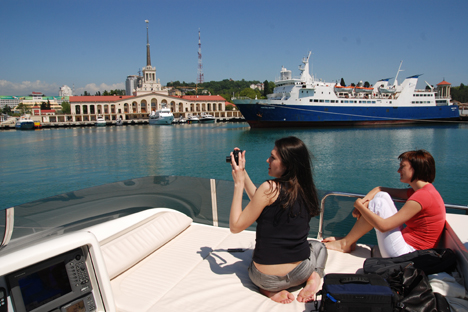Sochi’s Olympic heritage

Russian authorities are placing their major tourism bet on Sochi. Source: ITAR-TASS
International experience shows that the Olympics are a lucrative event for the host city. According to Andrew Zimbalist, an economics professor at Smith College who specializes in sports economics, when it is properly planned, a large sporting event accomplishes more than one thing simultaneously. It stimulates the development of the socio-economic sector and infrastructure, helping to attract missing financing to a concrete infrastructure project.
Russian practice confirms this theory. In order to transform the resort city into a Winter Olympic capital, in 2012 alone more than 4.5 billion euros were spent - this is nearly half the total investment volume of Krasnodar Region.
The Sochi 2014 Organizing Committee insists that the impressive financing is channelled purposefully toward Olympic Games preparations, which in turn have given a jolt to the region’s economic development. According to data from the Organizing Committee, 560,000 jobs have been created, with 70,000 of them in construction. In the future, another 26,000 positions will be added thanks to the development of tourism, Sochi Mayor Anatoly Pakhomov announced in December 2013.
The boom in the labour market has in turn made Sochi a leader in terms of the employment rate of the population. Sochi boasts one of the lowest unemployment rates in Russia: 0.1 percent, according to Pakhomov. Preliminary 2013 figures calculated by the Russian Federal State Statistics Service (Rosstat) peg Russia’s average unemployment rate at 6.3 percent.
It should be recalled that not even the recent financial crisis hindered Sochi’s rapid economic boom. In 2009, the employment level rose sharply. According to the Sochi Organizing Committee, the number of employed citizens working in construction rose by 14 percent, the number working in agriculture rose by 15 percent and the number working in transport and communications rose by 8 percent.
Pakhomov notes that along with the employment rate, salaries are rising. He said in December 2013 that on average, people working on the Olympic project earn around 760 euros. By comparison, the regional figure is 570 euros.
The active development of Olympic Sochi has elevated the city to a leading position among Russian cities in terms of quality of life (based on a ranking by the Urbanica Institute of Spatial Planning), and in terms of business climate. In 2012, Forbes magazine named Sochi Russia’s best city to do business in, based on the tolerance of tax officials, availability of financing and extent of administrative pressure on investors. The foray of leading international hotel companies—Kempinski, Marriott International and Rezidor Hotel Group—onto the Sochi’s local market attests to Sochi’s potential.
Future of tourism
Russian authorities are placing their major tourism bet on Sochi. According to data from the Sochi 2014 Organizing Committee, the PR company of the Winter Olympics capital already began attracting tourists five years ago. From 2005 through 2009, tourism grew by 55 percent—from 3.08 to 4.8 million visitors.
Over the last two years, the “construction project of the century” has deterred vacationers. According to Yuri Barzykin, vice president of the Russian Tourism Industry Union, domestic tourist numbers have dropped by around 20 to 25 percent. Nevertheless, Sochi has the potential to restore the tourism flow and at the same time emerge on the level of an international resort. The large hotel capacity and low prices that hoteliers will need to set in the face of competition will attract tourists. It should be recalled that according to assessments by Jones Lang LaSalle Hotels, by 2014 around 20,000 new hotel rooms would become available in Sochi. As such, experts have calculated that the volume of the city’s hotel market will grow more than tenfold (in 2007, when Sochi won the bid to host the Olympics, there were around 31,000 hotel rooms, of which experts considered only 1,700 to be of suitable quality).
Focus on infrastructure
For a resort city, it is not only hotels, but the infrastructure surrounding them, that are important. In the run-up to the Olympics, the public transport and roads were substantially renovated. So, after the Games, Sochi will be left with 367.3 kilometres of roads and bridges, 201 kilometres of railroad tracks, and 20 junctions and tunnels. The Sochi Organizing Committee emphasizes that the main goal is to increase the carrying capacities of the highways between Sochi and other cities, and to improve road quality. For this, a 10-kilometre highway was built around Sochi, and sections of the M-27 Djubga-Sochi federal highway to the Abkhazia border are being built.
All rights reserved by Rossiyskaya Gazeta.
Subscribe
to our newsletter!
Get the week's best stories straight to your inbox


